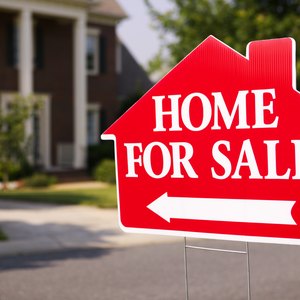
Bank-owned home listings are often sold online, but it's entirely possible to get the same listings by paying attention to local publications and contacting banks and other lenders directly. This method is less costly and will likely gain you access to more detailed, up-to-date listings than you would be able to access otherwise. Banks and other lenders seek to sell real estate as quickly as possible, and as such, these institutions tend to target advertising carefully to real estate investors and brokerages.
Save up enough cash to purchase a bank-owned home. In most areas, foreclosed properties sell at a 30 to 50 percent discount relative to similar properties in the area. The main catches are that you can't get a mortgage to purchase such homes at auction and that you can't view the home until you purchase it. This makes bank-owned property sales inaccessible to most individual investors. You may be able to get pre-approved for a mortgage to purchase a bank-owned home directly if you have an excellent credit rating.
Scan local newspapers and real estate publications for advertisements related to foreclosed property auctions, also known as Real Estate Owned (REO) sales. In some cases, banks and other lenders will sell such properties directly to interested buyers. In others, auctions are held at regular intervals to clear out foreclosed properties below market price. Review the listings at your disposal to gain a better idea of what prices are like in your area. Contact local banks and other lenders to request listings of foreclosed properties as well as dates and locations for future auctions.
Attend foreclosed property auctions prepared to bid on properties. If you're looking for investment opportunities, the condition of the underlying home may not be as important to you as the price. Be prepared for stiff competition from other individual investors and real estate brokerages looking to turn a quick profit. Have a price target in mind before you start bidding, to avoid spending too much at auction.
Visit the property that you purchased either directly from the lender or at auction. Contact a home appraiser to determine the current value and whether renovations may be legally required. Common issues with foreclosed homes include serious water damage, stripping of plumbing and electrical wire, damage to dry wall, stripped paint and other issues.
Warnings
Expect that you'll need to spend at least some money renovating the purchased property.
References
- Fannie Mae. "HomePath." Accessed May 29, 2020.
- Bank of America. "REO and Bank Owned Homes." Accessed May 29, 2020.
- Foreclosure.com. "Find Foreclosures in Your Area Today." Accessed May 29, 2020.
- RealtyTrac. "Start Your Foreclosure Search Here." Accessed May 29, 2020.
- U.S. Department of Housing and Urban Development. "Homes for Sale." Accessed May 29, 2020.
- Attom Data Solutions. "U.S. Foreclosure Activity Drops to 15-Year Low In 2019." Accessed May 29, 2020.
- U.S. Department of Housing and Urban Development. "203(k) Rehabilitation Mortgage Insurance." Accessed May 29, 2020.
- Fannie Mae. "HomePath Ready Buyer." Accessed May 29, 2020.
- Freddie Mac. "HomeSteps." Accessed May 29, 2020.
- U.S. Department of Housing and Urban Development. "203(K) Rehabilitation Mortgage Insurance: Limited 203(k) Mortgage." Accessed May 29, 2020.
- Fannie Mae. "Financing Opportunities for HomePath Homes." Accessed May 29, 2020.
- Freddie Mac. "HomeSteps: More Questions Answered." Accessed May 29, 2020.
- Freddie Mac. "Freddie Mac Announces Technology Enhancements to Give Lenders a Competitive Edge in Today’s Market." Accessed May 29, 2020.
Resources
Warnings
- Expect that you'll need to spend at least some money renovating the purchased property.
Writer Bio
John Hewitt began freelancing in 2008, writing about subjects ranging from music to stock trading, the energy industry and business. His ghostwritten work has appeared all over the Web. He attended New York University, pursuing a bachelor's degree in history.

